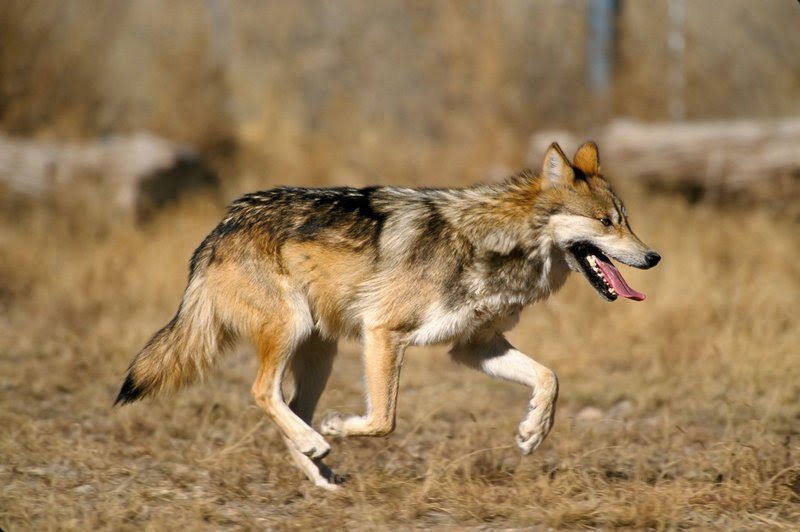Asha, the young, endangered Mexican gray wolf famous for her foray into the Sangre de Cristo Mountains, once again journeyed to northern New Mexico last fall. But, she was captured again and now lives in captivity with her pack mates Arcadia and Horizon. Together, this wolf family is known as the Caldera pack, after the Valles Caldera National Preserve where Asha found solace and freedom. Asha is one of the critically endangered Mexican gray wolves who needs the freedom to roam. But unscientific policies prevent lobos from accessing habitat north of Interstate 40 – roaming free in the wild where they belong.
This is wrong. Wolves need to be wild, and arbitrary boundaries like Interstate 40 make no sense to wolves or to scientific recovery.
You can help Asha and the Caldera pack by writing a short, powerful letter to the editor and submitting it to your local paper. Writing a letter to the editor is a great way to catch the attention of public officials and elected representatives, and raise awareness in your community about the importance of recovering lobos, New Mexico’s iconic canine.
We’ve made it easy for you to find a local or statewide paper and submit your short piece. Below are most of New Mexico’s newspapers that accept LTEs. And at the bottom are some talking points to consider.
Send your letter to the editor to one or more of these New Mexico newspapers:
- Alamogordo Daily News – 225 word limit – Submit here»
- Albuquerque Journal (including Moriarty) – 350 word limit – Submit here»
- Artesia Daily Press – 300 word limit – Email to editor@artesianews.com
- Carlsbad Current-Argus – Be brief – Submit here»
- De Baca County News (Fort Sumner) – Be brief & include telephone number – Email to pecospub@plateautel.net
- Deming Headlight – 300 word limit – Email to debbie@demingheadlight.com
- Desert Exposure (Las Cruces) – Be brief – Email to elva@lascrucesbulletin.com
- The Independent – Read the guidelines and email to editor@edgewood.news
- El Defensor-Chieftain (Socorro, NM) – 550 word limit – Submit here»
- Farmington Daily Times – 400 word limit – Submit here»
- Gallup Independent – 800 word limit – Read the guidelines and email to dwickerd@gallupindependent.com or ctsosie@gallupindependent.com.
- Hidalgo County Herald (Lordsburg) – Be brief & include name/telephone number – Email to hcherald@gilanet.com
- Hobbs News-Sun – Email to editor@hobbsnews.com
- Las Cruces Sun-News – 300 word limit – Submit here»
- Las Vegas Optic – 250 word limit – Submit here»
- Los Alamos Reporter – Be brief – Email to maire@losalamosreporter.com
- Los Alamos Daily Post – Be brief – Email to caclark@losalamosdailypost.com
- Quay County Sun (Tucumcari) – 500 word limit – Submit here»
- Rio Grande Sun (Española) – 250 word limit – Submit here»
- Rio Rancho Observer – 500 word limit – Submit here»
- Roswell Daily Record – 250 word limit –Submit here»
- Ruidoso News – 225 word limit – Submit here»
- Santa Fe New Mexican – 150 word limit – Submit here»
- Sierra County Sentinel – 250 word limit – Submit here»
- Silver City Daily Press – 250 word limit – Submit here»
- Taos News – 250 word limit – Submit here»
- The Eastern New Mexico News (Clovis) – Submit here»
- Valencia County News Bulletin (Belen) – 250 word limit – Submit here»
Talking points to include in your letter to the editor
- Asha, who was wrongly taken out of the wild and now lives in captivity, should be released back into the wild with her pen mates Horizon and Arcadia.
- Governor Michelle Lujan Grisham should rescind New Mexico’s opposition to recovering wolves north of Interstate 40. It is an outdated and backward policy that is not supported by science, and the clear actions of a pioneering female lobo named Asha.
- Lobos are critical to the environments of the desert southwest. They keep prey populations healthy and in balance, protect riparian and aquatic resources, and indicate the health of entire ecosystems.
- Science shows that Mexican gray wolves need access to habitat in the Southern Rocky Mountains and Grand Canyon Ecosystem (both north of Interstate 40) to truly recover. Ideal habitats for Mexican wolves extend north of I-40, and it’s crucial to consider their need to follow natural corridors and establish sub-populations in additional areas. Independent, peer reviewed science strongly suggests that recovery for Mexican wolves will entail three interconnected subpopulations of at least 200 wolves each, one in the Gila Bioregion, one in the southern Rocky Mountains, and one in the Grand Canyon Ecoregion.
- Lobos pose no threats to people or livestock. Asha has never had conflict with livestock. There’s no reason to remove Asha and other wolves that roam north.

Mexican Gray Wolf